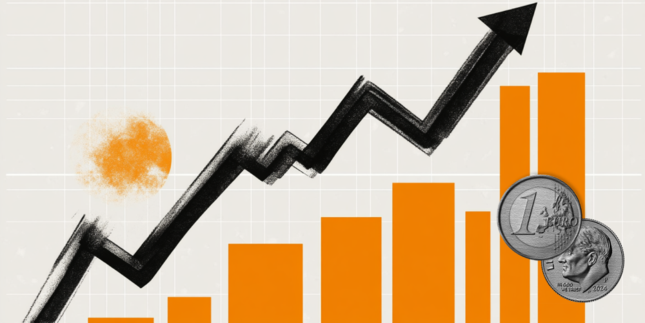- USD/CAD holds steady around 1.4320 in Monday’s late American session.
- Trump said he may give some countries breaks on reciprocal tariffs.
- Higher Crude Oil prices might boost the commodity-linked Loonie.
The USD/CAD pair trades on a flat note near 1.4320 during the late American session on Tuesday. The pair consolidates in a narrow trading range amid further confusion about US President Donald Trump's plans for the tariff announcement scheduled for April 2. The US Conference Board’s Consumer Confidence gauge, New Home Sales and the Richmond Fed Manufacturing Index will be published later on Tuesday.
Trump said late Monday that he will announce tariffs on automobile imports in the coming days and indicated that some countries will receive breaks from reciprocal tariffs on April 2. Trump signaled trading partners would receive possible exemptions or reductions.
However, Trump also stated that he planned to proceed with sector-specific tariffs on lumber and semiconductors and repeated his threat to impose duties on pharmaceutical drugs in “the very near future.” Investors remain concerned over a potential rise in inflation and recession ahead of Trump’s reciprocal tariffs. This, in turn, might exert some selling pressure on the Greenback against the Canadian Dollar (CAD).
Meanwhile, a rise in Crude Oil prices could boost the commodity-linked Loonie and create a headwind for USD/CAD. It’s worth noting that Canada is the largest oil exporter to the United States (US), and higher crude oil prices tend to have a positive impact on the CAD value. Nonetheless, hopes for a positive outcome from Russia-Ukraine peace talks could weigh on the black gold, which undermines the Loonie and helps limit the USD/CAD pair’s losses.
Canadian Dollar FAQs
The key factors driving the Canadian Dollar (CAD) are the level of interest rates set by the Bank of Canada (BoC), the price of Oil, Canada’s largest export, the health of its economy, inflation and the Trade Balance, which is the difference between the value of Canada’s exports versus its imports. Other factors include market sentiment – whether investors are taking on more risky assets (risk-on) or seeking safe-havens (risk-off) – with risk-on being CAD-positive. As its largest trading partner, the health of the US economy is also a key factor influencing the Canadian Dollar.
The Bank of Canada (BoC) has a significant influence on the Canadian Dollar by setting the level of interest rates that banks can lend to one another. This influences the level of interest rates for everyone. The main goal of the BoC is to maintain inflation at 1-3% by adjusting interest rates up or down. Relatively higher interest rates tend to be positive for the CAD. The Bank of Canada can also use quantitative easing and tightening to influence credit conditions, with the former CAD-negative and the latter CAD-positive.
The price of Oil is a key factor impacting the value of the Canadian Dollar. Petroleum is Canada’s biggest export, so Oil price tends to have an immediate impact on the CAD value. Generally, if Oil price rises CAD also goes up, as aggregate demand for the currency increases. The opposite is the case if the price of Oil falls. Higher Oil prices also tend to result in a greater likelihood of a positive Trade Balance, which is also supportive of the CAD.
While inflation had always traditionally been thought of as a negative factor for a currency since it lowers the value of money, the opposite has actually been the case in modern times with the relaxation of cross-border capital controls. Higher inflation tends to lead central banks to put up interest rates which attracts more capital inflows from global investors seeking a lucrative place to keep their money. This increases demand for the local currency, which in Canada’s case is the Canadian Dollar.
Macroeconomic data releases gauge the health of the economy and can have an impact on the Canadian Dollar. Indicators such as GDP, Manufacturing and Services PMIs, employment, and consumer sentiment surveys can all influence the direction of the CAD. A strong economy is good for the Canadian Dollar. Not only does it attract more foreign investment but it may encourage the Bank of Canada to put up interest rates, leading to a stronger currency. If economic data is weak, however, the CAD is likely to fall.
Information on these pages contains forward-looking statements that involve risks and uncertainties. Markets and instruments profiled on this page are for informational purposes only and should not in any way come across as a recommendation to buy or sell in these assets. You should do your own thorough research before making any investment decisions. FXStreet does not in any way guarantee that this information is free from mistakes, errors, or material misstatements. It also does not guarantee that this information is of a timely nature. Investing in Open Markets involves a great deal of risk, including the loss of all or a portion of your investment, as well as emotional distress. All risks, losses and costs associated with investing, including total loss of principal, are your responsibility. The views and opinions expressed in this article are those of the authors and do not necessarily reflect the official policy or position of FXStreet nor its advertisers. The author will not be held responsible for information that is found at the end of links posted on this page.
If not otherwise explicitly mentioned in the body of the article, at the time of writing, the author has no position in any stock mentioned in this article and no business relationship with any company mentioned. The author has not received compensation for writing this article, other than from FXStreet.
FXStreet and the author do not provide personalized recommendations. The author makes no representations as to the accuracy, completeness, or suitability of this information. FXStreet and the author will not be liable for any errors, omissions or any losses, injuries or damages arising from this information and its display or use. Errors and omissions excepted.
The author and FXStreet are not registered investment advisors and nothing in this article is intended to be investment advice.
Recommended content
Editors’ Picks

EUR/USD clings to gains above 1.1350 after mixed US data
EUR/USD stays in positive territory above 1.1350 in the American session on Thursday. The US Dollar (USD) struggles to gather strength following the mixed macroeconomic data releases from the US, allowing the pair to cling to its daily gains.

GBP/USD holds steady near 1.3300 on renewed USD weakness
GBP/USD stabilizes at around 1.3300 in the second half of the day on Thursday as the USD finds it difficult to build on this week's gains. The uncertainty surrounding the US-China trade relations moving forward and mixed data releases from the US help the pair hold its ground.

Gold rebounds after sharp decline, holds comfortably above $3,300
After posting large losses on Tuesday and Wednesday, Gold gathered recovery momentum and advanced toward $3,350 on Thursday. Markets remain wary of a re-escalation of the US-China trade conflict, helping XAU/USD find demand as a safe haven.

Bitcoin Price corrects as increased profit-taking offsets positive market sentiment
Bitcoin (BTC) is facing a slight correction, trading around $92,000 at the time of writing on Thursday after rallying 8.55% so far this week. Institutional demand remained strong as US spot Exchange Traded Funds (ETFs) recorded an inflow of $916.91 million on Wednesday.

Five fundamentals for the week: Traders confront the trade war, important surveys, key Fed speech Premium
Will the US strike a trade deal with Japan? That would be positive progress. However, recent developments are not that positive, and there's only one certainty: headlines will dominate markets. Fresh US economic data is also of interest.

The Best brokers to trade EUR/USD
SPONSORED Discover the top brokers for trading EUR/USD in 2025. Our list features brokers with competitive spreads, fast execution, and powerful platforms. Whether you're a beginner or an expert, find the right partner to navigate the dynamic Forex market.



